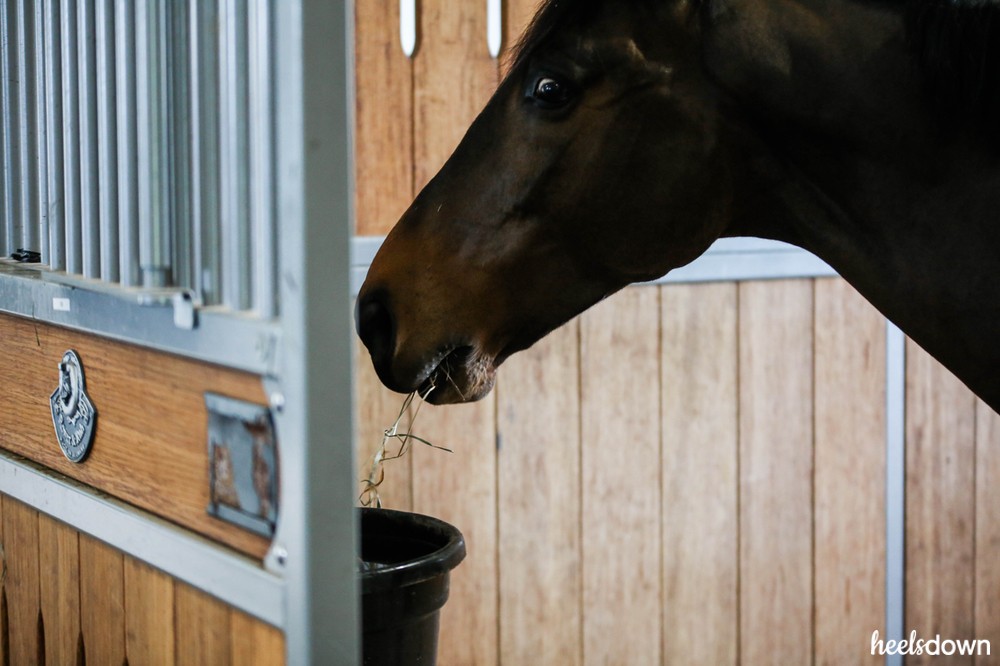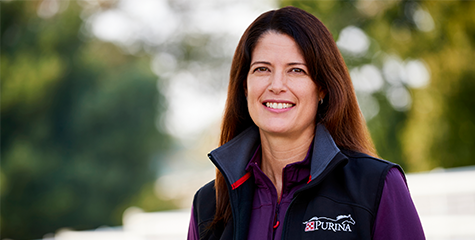Demystifying Gastric Health Care In Horses

Ulcers. It’s a dreaded word no horse owner wants to hear, but is sadly all too common.
Maintaining a healthy gut in sport horses can be a tricky endeavor. Luckily there are many – perhaps too many – products out there to provide horses with some relief and protection. But understanding the needs of a horse’s stomach and hind gut requires a bit of an education.
Heels Down spoke with Dr. Kelly Vineyard, a Senior Nutritionist on the Equine Technical Solutions Team at Purina Animal Nutrition. She’s a horse owner herself – with USDF bronze and silver medals in dressage – and holds a Master’s and Doctoral degrees in equine nutrition from the University of Florida. Her work has been published the Journal of Animal Science, the Journal of Equine Veterinary Science and in a chapter of the textbook, Equine Applied and Clinical Nutrition.

Any advice on how to cut through marketing and find a product that’s right for your horse?
It can be completely overwhelming – there are thousands of products out there. I have two answers for this. First, if you’re looking for a supplement to support your horse’s gastric health, you need to understand that no supplement alone can guarantee good gastric health. A supplement is just one piece of the puzzle – an effective gastric health management plan also includes implementing feeding and management practices that have been shown to reduce the risk of gastric ulcers in horses.
When you’re looking for a supplement, think of it critically using the “Test R.I.D.E.” , which is an acronym we came up with at Purina to help evaluate nutrition products. Look for Research behind the product (ideally, published research that has been conducted in horses). Make sure the Ingredients make sense. Dose is also important – make sure it’s a high enough amount to help a 1,200-pound animal. Then evaluate the noticeable benefits (Efficacy) from feeding the supplement.
Is it possible to do too much? Like too many supplements?
The short answer is yes. It’s something I see quite commonly – someone will have four or five different gastric health supplements in their program and that’s just a big waste of money. It would be better spent on one good quality gastric supplement that is backed by research in horsest, and use it appropriately and according to the package directions. Depending on a horse’s risk factors, it may also be helpful to layer a preventative medication on top on a daily supplement during stressful times, like when travelling. Our team of PhD nutritionists have put together an informative Gastric Health Brochure that outlines the most important feeding and management strategies shown to promote and maintain optimal gastric health.
If your horse has been diagnosed with ulcers by a veterinarian, then they need to be treated. That’s where a medication like omeprazole (GastroGuard) comes in. Medications are used to treat, and supplements should be used to support treatment and help promote optimal gastric health after the treatment is finished.
What role does forage play in maintaining a happy and healthy gut?
It goes without saying that forage should be the cornerstone of any horse’s diet. That’s what they’re designed to digest. A forage-first diet is a great strategy in mitigating gastric upset. Any hay that contains legumes – like an alfalfa hay – serves as a natural buffer of stomach acid.
Incorporating alfalfa hay into the ration is a good idea for most horses prone to ulcers. Even in the form of pellets or cubes. It’s important to note that one flake of alfalfa hay in the morning will only have a buffering effect for a few hours. More frequent feedings are definitely helpful. Ideally, you’d want to keep hay in front them as often as you can.
What are the right signs to look for that a horse is doing well on its diet?
Manure is actually a great indicator of digestive health. If you have well-formed fecal balls that are not too dry and not too wet, that’s a good indicator that the horse’s hind-gut is working properly. You can also take a step back and look at the horse as a whole, and ask yourself does he have a shiny coat? Does he have a healthy bloom? Adequate fat cover? Those are all good indicators that you’re doing the right thing from a nutritional standpoint. The bad news is that there are no telltale physical signs that you’re meeting all of your horse’s nutrition requirements. The only way to know that for sure is to do a ration analysis – calculating what they’re eating and how much and comparing that to what their nutrition requirements are – that requires math. As an Equine Nutritionist, my job at Purina is essentially to “do the math” for horse owners and make sure our feed products are providing appropriate nutrition for their horses. If you choose a feed that is appropriate for your horse’s age and calorie needs, follow the feeding directions on the tag (don’t feed below the minimum recommended feeding rate), and pair that with adequate levels of good quality forage, your horse’s daily nutrient requirements will be met.
Any common feeding myths you want to dispel?
There are so many, and unfortunately, it’s easy to fall victim to them. Myths are often based in a little bit of truth, but if you take a step back and objectively evaluate some of these things, you realize they’re not fully true. Specific to gastric health and ulcers, one misconception I see repeatedly is the assumption that all horses with ulcers are going to show some type of outward signs of pain or bad behavior. We expect horses with ulcers to kick out, become sour under saddle, or pin their ears when being brushed or girthed up, but that is not always the case – there are many horses out there with gastric ulcers that can be quite stoic and won’t show these behavioral signs. They may show other signs, like going off feed, teeth grinding, or losing weight despite a good diet, but bad behavior is not the end-all, be-all for gastric ulcers. Scoping horses is the only way to definitively diagnose ulcers, and many owners are shocked when they discover their horses have ulcers despite the fact their horses aren’t displaying any outward signs of pain.


